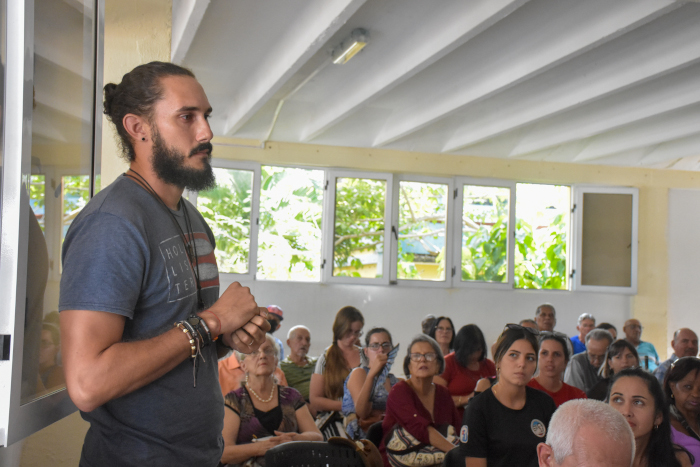CAMAGÜEY.- The University of Camagüey (UC) Ignacio Agramonte Loynaz, the first created by the Revolution, is celebrating. Although the date of its foundation still generates controversy among historians and specialists of the territory, every November 6th the institution commemorates the beginning of higher education in this province.
They began in 1967 with the specialties of Agricultural Engineering at the Álvaro Barba Cane Institute, and Pedagogy at the Cándido González Railway Institute, which later moved to San Isidro Farm on the outskirts of the city. In 1974, both degrees were operating in the current headquarters, then under construction.
Little by little, the campus grew with the help of the authorities and the members of the Federation of University Students (FEU), and other universities emerged from the UC, such as those of Ciego de Ávila, Las Tunas, and the Medical Sciences of Camagüey. At the beginning of the new century, it joined the universalization of university education advocated by the Revolution, through the creation of university campuses in the 13 municipalities of the province. And in 2014, the José Martí Pedagogical University and the Manuel Fajardo Sports University were integrated.
Much has changed in Camagüey's higher education institution in these 55 years. Today it has ten faculties and more than 50 degrees in face-to-face, semi-face-to-face, and distance education modalities. It stands out in scientific, investigative, and teaching matters, with results recognized nationally and internationally, and endorsed in the recent external evaluation.
As part of the anniversary celebrations, the school's Cultural Management Center served during the week as a space for exchange between founders, new teachers, and students, to share experiences and remember the importance of safeguarding the center's history.
Adelante Digital was at this generational meeting, in search of anecdotes and feelings of those who cannot conceive of their lives without the first university created by the Revolution.
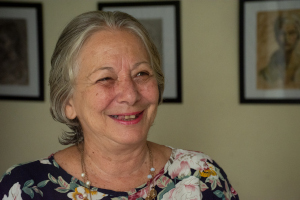 Josefa Francisca Nordelo, founder of the Pedagogy career:
Josefa Francisca Nordelo, founder of the Pedagogy career:
“In November 1967, the province was filled with joy, because for the people of Camagüey it meant a joy to have a university center. I began my studies at the Railway headquarters, and I remember it as very happy years, with a very strong, disciplined, and hard-working FEU. The students fulfilled the tasks required in those times, we helped to build the premises in the San Isidro Farm and then those of the current headquarters. The cultural activity was also very strong, and the FEU made itself feel outside the walls.
“I remember with special affection an exchange we did with the University of Antofagasta in Chile, we received the visit of the Folkloric Ballet of that country and Víctor Jara. It was an emotional encounter for us, and even more when we learned later that many of those boys had been assassinated during the Pinochet period.
“I think that the FEU now also has very valuable and active members, it is still at the forefront, but with different tasks. The Revolution has a bastion in it.
“Having lived the history of the University from its foundation to the present day represents pride for me and forms an inseparable part of my life. At UC I have been improving my teaching categories and participating in exchanges with professors and specialists from other universities. Many of those who taught me in college later became my co-workers, and now some of my former students work with me. It gives us great joy to have such prepared and studious young people, a good injection to the department, and we are contributing to their training. I try to help them grow as they did with me at the time."
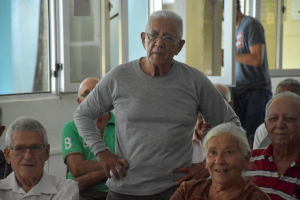 Carlos Díaz Barranco, first president of the FEU at UC:
Carlos Díaz Barranco, first president of the FEU at UC:
“This university is the result of the work of Fidel who said that this province had to be lifted out of poverty. In the beginning, the FEU really wanted to do things. We dared to place a UC poster on the San Isidro farm, and we volunteered to support the 1970 harvest, even though many of us had never touched a machete. We were working for a week until a cook took pity on us and told us that he would give us a course in cutting cane. That man became a teacher.
“I remember that during the special period, the University was kept up by the students. In the different faculties, we converted the UC into our professional practice units. The architects and engineers were linked to maintenance, the Mechanics to help with turbine problems, and so on with each degree. We would meet every other night to plan how to get food, and we even traveled to the East to look for it. Without the students I don't know what the University would have been, that is why it is so important that today that desire to do things is not lost because they and the young professors are the protagonists”.
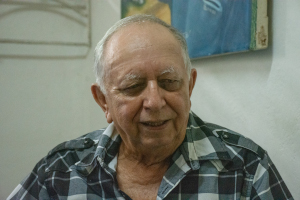 Modesto Ponce, founder of the Agronomy degree:
Modesto Ponce, founder of the Agronomy degree:
“The Agronomy degree arose from the province's need to graduate agricultural engineers, later it was divided and I specialized in the livestock branch. When we moved to the current headquarters it was a small building, we did volunteer work to gradually build what it is today.
“The work of the FEU has always been very responsible, but I consider today's boys much better because we live in a scenario of great aggressiveness in social networks. Now the fight is more difficult, a lot of hate appears on the Internet, and many lies and our student leaders face all this with dignity, like Mella.
“UC has experienced very complex moments, one was the pandemic, where we lost several professors, and the institution became a hospital.
“Working here means for me an enormous commitment to my colleagues and the direction of the Faculty. UC has given me a lot, I did a PhD. in the German Democratic Republic and then I worked there for a few years at the embassy attending the office of students and postgraduates. It was a commitment to my university to work at full capacity. It involved a tremendous sacrifice for me due to the very high demands in the academic order. Personally, working here has helped me get through difficult times with my family.
“Many here know me as the man who burned a bus. It is a funny anecdote from my student stage. We had good relations with the Camagüey Army Corps, which provided us with smoke bombs to carry out publicity actions. We hit squares and parks, drawing attention to ourselves with smoke to promote our college games or cultural festivals. The firefighters always accompanied us. On one occasion, near the Railway Terminal, one of the pumps was defective and sparked, causing a fire in the plastic seats of a bus. The bus burned down and they took me into custody for being the responsible leader of the FEU, and the rector had to go to get me out.”
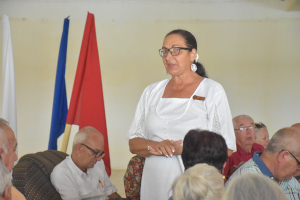 Flor de María Fernández, professor of Marxism:
Flor de María Fernández, professor of Marxism:
“I have been a person from a single workplace. I was placed here as a fresh graduate in 1986 and since then I have been very proud of UC, contributing everything I can to keep it growing.
“When I was a leader of the Young Communist League, the slogan I come to deliver my heart was very popular, and the need arose to leave that slogan on a wall. We made a mural with a drawing of a heart between two hands and tinajón symbols, Professor Roberto Portuondo helped us, who always accompanied the young people. Whenever I pass by the place where the mural is, I remember my young years at UC and the work of that teacher.
“I have a degree in Scientific Communism, a Ph.D. in Philosophical Sciences and for me, it was very important to learn about the experience of Chinese socialism, and thanks to the University I fulfilled the dream of traveling to that country and many historical places in the world. I, the daughter of humble workers, have been able to do all this thanks to my work at UC.
“Everything that I am and what I have achieved is linked to the institution and its people. Some saw me arrive very young and now it's my turn to train new generations of professionals in the territory, and witness the growth of many who pass through here”.
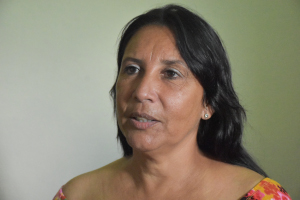 Gladya Rodríguez Gamboa, dean of the Faculty of Social Sciences:
Gladya Rodríguez Gamboa, dean of the Faculty of Social Sciences:
“I started here in 2007 as a student of the Psychology degree for the course of comprehensive improvement for young people, because I was a worker. It was a nice experience to see how the differences between the students of the regular day course and us workers were not noticed; the treatment of teachers and participation in activities was the same.
“My professional and personal growth is closely linked to UC. I decided to leave the job I had before to dedicate myself fully to studying. At first, I felt out of context in the group, but it was a surprise when my colleagues elected me as president of the FEU on campus. I am proud to see that many of my contemporaries have become excellent professionals, teachers, and managers.
“After graduating, I assumed different management positions in various faculties, up to my current position as dean. I had the support of many colleagues to whom I owe much of what I know about management.
“Through the University I got to know Palma City and La Gloria, when we were given the task of visiting the affected places of the North Keys, after the passage of Hurricane Irma. It was an enriching experience as a psychologist, the University left an imprint on the community, but also the community on us. In the different activities that we carry out, it is beautiful how we integrate with the residents, when they see us get off the buses and start working with them, muddy, their faces change”.
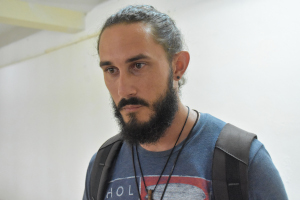 Adrián Soca, professor of Spanish-Literature:
Adrián Soca, professor of Spanish-Literature:
“I am fortunate to have received classes and now be a co-worker of renowned professors such as Matilde Varela, who received the Espejo de Paciencia distinction this year, and many others who had a great impact on my teaching and research training. I learned from them the concern for detail, to be attentive to immediate problems, day-to-day, to history, and to be useful in creating.
“That this is the first University created by the Revolution is quite a symbol, because before the Camagüey's inhabitants had to go to study in Havana or other regions and only the elite remained here. The creation of this center is one of the most inclusive events that have happened in the province, and today one of my greatest joys is being able to give classes to boys who live in rural towns and very far away from the city. Some leave their homes in Guarandinga, on horseback, or walk nine kilometers to the highway to come to Camagüey, but they are here and have the opportunity to obtain a university degree, improve themselves professionally, and morally and change their lives.
“I enjoy the Taíno Sports Games, an opportunity to share with the students, celebrate with them the victories or suffer the defeats. Several moments here have left important memories in me, one of them was when the organizations of the province summoned the UC to help the victims of Hurricane Irma, and the response of the students and professors was enormous, we were in Puerto Piloto cleaning and rebuilding. A more recent experience was when I entered the Red Zone at the beginning of the COVID-19 pandemic, I did it together with many students, some freshmen who had never sat in the classrooms of the University and had the courage to be close to people infected with a disease about which little was known. These examples make me want to stay much longer in this school, and always next to its students”.
Translated by Linet Acuña Quilez



